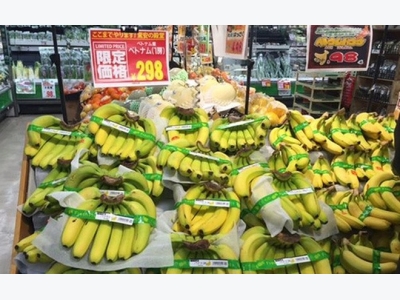VN eyes more fruit exports to Japan

Japan has just opened its market to Vietnamese bananas, mango and dragon fruits, as they have met the country’s plant quarantine regulations. — Photo vneconomy
HÀ NỘI — Even as Japan is the fifth largest importer of Việt Nam’s agricultural products, only three kinds of Vietnamese fresh fruits are being sold in the country
A report from the Ministry of Industry and Trade’s Export and Import Department showed that Việt Nam earned US$1.46 billion from exporting agricultural products and seafood to Japan last year, a year-on-year increase of 6.6 per cent. Of these, vegetables and fruits were valued at $75.1 million, up 1.5 per cent.
The department said the implementation of Việt Nam-Japan Economic Partnership Agreement had opened a great opportunity for Vietnamese exports to enter this market, in which agricultural products and seafood had been given tariff preferences.
However, Japan is a market that demands high food hygiene and safety and implements many measures, as well as technical barriers to import agricultural products.
Deputy Minister of Industry and Trade (MoIT) Trần Quốc Khánh said Japan’s standards of quality and food safety was almost equivalent to or even higher than normal international standards.
Khánh said what’s important was that those standards were in line with the World Trade Organisation’s principles — it meant there was no discriminatory treatment between domestic goods and import products. All Vietnamese vegetables and fruits for export would have to undergo adjustment on import tax, as well as hygiene measures.
“Meeting Japan’s quality standards is a compulsory requirement for every importer. The Vietnamese exporter will have to meet the demand, if they want to penetrate this market,” Khánh told chinhphu.gov.vn.
As for frozen vegetables and fruits, their imports need a certificate of hygiene quarantine issued by the Vietnamese authorised body and random examination by Japanese quarantine and food hygiene and safety agency, so that their import do not run into hurdles.
Meanwhile, Vietnamese fresh vegetables and fruits have not been able to enter the Japanese market much, because the country closely regulates its import products over “concerns about the spread of epidemic diseases and pests from exporting countries.”
Currently, Japan has just opened its market to Vietnamese banana, mango and dragon fruits, as they have met the country’s plant quarantine regulations.
The import of these three fruits was made possible through the joint efforts of MoIT and the Ministry of Agriculture and Rural Development in resolving technical barriers on quarantine.
“The import of fruits to Japan will be considered by the Ministry of Agriculture, Forestry and Fisheries, case by case, based on proposals from export countries through a process of many procedural steps, including their visit to export countries to examine and evaluate the products’ quality,” said Khánh.
Technical standards
To push up trade, the Japanese Government still cooperates with the Vietnamese Government in raising the capacity to meet Japan’s quality standards for import products.
MoIT said the implementation of the pilot project for self-certification of the origin of goods within ASEAN was a general trend in the current negotiations of free trade agreements, contributing to helping businesses minimise the waiting time for certificate of origin and creating conditions for trade and export of goods, not only for vegetables and fruit, but also other products.
The ministry was pushing for reform in administrative procedures by issuing certification of goods through internet to help exporters save time.
Nguyễn Sơn, the deputy head of the Inter-sectorial Steering Committee for International Integration, said Việt Nam spent eight years of negotiation to reach an agreement on shipping dragon fruit to Japan and five years to bring mango to this country. The Japanese market was a "severe test" of the quality of Vietnamese fruits.
"When Việt Nam passes such examination easily, the country’s export of agricultural products in general and fruits in particular will actually take off," said Sơn
Related news
 Việt Nam should improve rice quality in long-term strategy
Việt Nam should improve rice quality in long-term strategy Experts believe Việt Nam needs a long-term strategy to increase the quality of its rice exports to create sustainable growth in the future.
 Against the grain, Vietnam must shift to high quality rice exports
Against the grain, Vietnam must shift to high quality rice exports Vietnam exported 4.54 million tonnes of rice worth almost US$2 billion, up 0.3 percent in volume and down 14.9 percent in price compared to the same period
 Asia Rice-African demand boosts Vietnam rates, India prices dip to 4-month low
Asia Rice-African demand boosts Vietnam rates, India prices dip to 4-month low Vietnamese rice export prices rose to their highest in two months this week as demand from African buyers increased, while prices in top exporter India
 Hi-tech dragon fruits planting brings efficiency
Hi-tech dragon fruits planting brings efficiency A review of high-tech dragon fruit planting models in Duong Xuan cooperative as well as introduced unmanned spraying equipment to manage pests on dragon fruits.
 Long An: 4 projects enter semi-finals of National youth start-up contest 2019
Long An: 4 projects enter semi-finals of National youth start-up contest 2019 Long An has 4 out of 105 youth's projects selected for the semi-final of the Innovative Startup of Rural Youngsters Project Contest 2019.